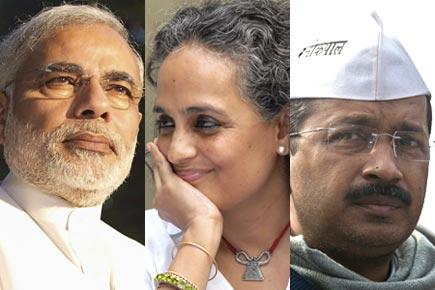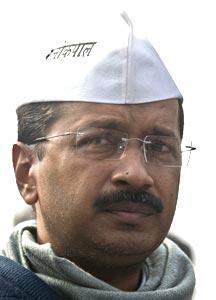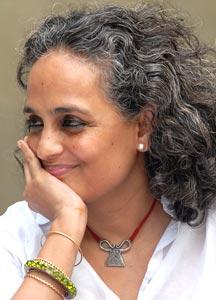Bharatiya Janata Party's prime ministerial candidate Narendra Modi and Aam Aadmi Party leader Arvind Kejriwal have made it to Time 100 list of the world's most influential people along with Indian novelist Arundhati Roy

Washington: Bharatiya Janata Party's prime ministerial candidate Narendra Modi and Aam Aadmi Party leader Arvind Kejriwal have made it to Time 100 list of the world's most influential people along with Indian novelist Arundhati Roy.
ADVERTISEMENT



Narendra Modi, Arvind Kejriwal and Arundhati Roy
While Modi figures in the category of "leaders", Kejriwal is listed among the "pioneers" and Roy makes the grade among "icons" in the annual list released Thursday after an online poll of readers. Modi is described as "The divisive politician poised to lead the world's largest democracy" in a profile by Fareed Zakaria, the Indian-American host of CNN's Fareed Zakaria GPS.
"Elections are reactions, often negative reactions. That is surely the explanation for the breathtaking rise of Narendra Modi, who 'if the opinion polls are accurate' is poised to become India's next Prime Minister, and thus the world leader chosen by the largest electorate on the planet," he writes.
"Modi has a reputation for quick action, encouraging the private sector, and good governance. He also has a reputation for autocratic rule and a dark Hindu-nationalist streak," he said. "But those concerns are waning in a country desperate for change."
Kejriwal, listed among pioneers, is described as a "powerful outsider in Indian politics" by Rajdeep Sardesai, editor-in-chief of the IBN18 Network. "Kejriwal is the antithesis of the modern-day Indian politician. He's no Hindu nationalist, he doesn't have a famous surname, and no, there is no evidence that he has made money from politics," Sardesai wrote.
"Though his administration (in Delhi) lasted a mere 49 days, with Kejriwal proving less adept at turning the wheels of government than campaigning against it, his image as the quintessential outsider taking on powerful interests - 'a David versus many mighty Goliaths' - has earned him a unique place in Indian politics," he added.
Among the icons, Roy, the author of "The God of Small Things" makes it as "the novelist who is the conscience of India". In a profile, author Pankaj Mishra says: "More remarkably, Roy's subsequent nonfictional engagement with the conflicts and traumas of a heedlessly globalised world has manifested the virtues of an unflinching emotional as well as political intelligence."
"In an age of intellectual logrolling and mass-manufactured infotainment, she continues to offer bracing ways of seeing, thinking and feeling," he wrote.
 Subscribe today by clicking the link and stay updated with the latest news!" Click here!
Subscribe today by clicking the link and stay updated with the latest news!" Click here!






